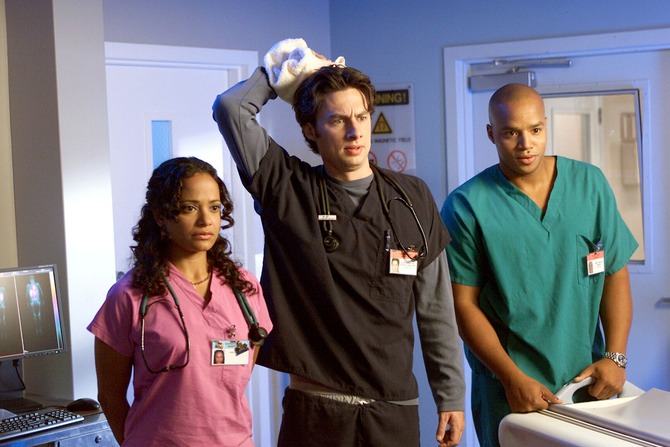
 A few years ago, we (my husband, two young sons and I) lived in a house that was very cute, but sometimes not very practical. Our refrigerator, for example, was tiny. And the more I fed my growing family, the more I craved a little more space. I went on a search for a “garage fridge”–that ubiquitous Midwestern appliance where people keep extra beverages, garden surplus, food for parties, etc. I found that even dormitory-sized refrigerators were outrageously expensive, and so when I found a gently used refrigerator at the neighborhood garage sale for $100, I knew I had to have it. I ran home to get some cash.
A few years ago, we (my husband, two young sons and I) lived in a house that was very cute, but sometimes not very practical. Our refrigerator, for example, was tiny. And the more I fed my growing family, the more I craved a little more space. I went on a search for a “garage fridge”–that ubiquitous Midwestern appliance where people keep extra beverages, garden surplus, food for parties, etc. I found that even dormitory-sized refrigerators were outrageously expensive, and so when I found a gently used refrigerator at the neighborhood garage sale for $100, I knew I had to have it. I ran home to get some cash.
My mom was visiting that weekend, and I asked her about the refrigerator. “Should I try to bargain for this? Should I ask them if they’ll take less?” I’m notoriously bad at haggling. My mom, who is painfully frugal, said simply, “No. You should give them your hundred dollars, and say thank you.” Since then, that phrase has become famous in our house for unexpected gifts: “You take it, and you say thank you.” I suppose it’s our equivalent of, “Don’t look a gift horse in the mouth.” I did nothing to earn or deserve that good bargain, and I should be grateful that it showed up in my life when I needed it.
I feel that way about grace. Now, let me be clear: I don’t think Jesus put a bargain refrigerator in my life. I don’t think that any good financial fortune has come my way by way of the Holy Spirit. I do believe, however, that there are plenty of moments in my life that I did not earn or deserve, but I should take them and be thankful.
Some time after the bargain refrigerator showed up in our lives, we moved to Texas. We enrolled our boys in school, and a few weeks into the school year, we got an email from the school nurse that our oldest son had passed his vision exam and did not need vision correction. “He doesn’t need vision correction yet,” I thought. Rolling the genetic dice in both my husband’s and my families, corrective lenses are more of a “when” instead of an “if” in our kids’ futures. Shortly after she sent the email, though, the school nurse called me. “He passed,” she said, “but…”

What followed the “but” turned into about a month of agony. He tilted his head to one side when viewing the vision chart during the school vision exam, and so the school nurse told me about her concern. I took him to an ophthalmologist for an agonizing three-hour doctor’s appointment, which ended with the doctor inappropriately tickling my son. “One of his eyes sits ever-so-slightly more forward in his skull than his other eye. You can see it, right?” I couldn’t see it, even though I wanted to see it. “Just go home and look at his baby pictures,” she said. “I’m sure you’ll see that one eye looks bigger than the other in those pictures. We’re all supposed to be symmetrical, and he’s not.” As a completely asymmetrical person, I tried to keep symmetrical flames from shooting out of my ears, thanked her for her time, and left. The baby pictures, I discovered, revealed nothing that I hadn’t seen before: our perfectly imperfect son, but no ophthalmological clues.
We followed up with our son’s pediatrician, and then a pediatric ophthalmologist, and then an MRI under sedation. What was making our son’s eye sit forward in his skull? A minor imbalance since birth, or a something? I tried, mostly successfully, to stay away from Google, but the possibilities rolled around in my own (probably asymmetrical) brain for the days leading up to the tests. What if … what if … what if.
“What if he’s OK, and you’re worrying for nothing?” was my husband’s completely unhelpful response. Didn’t he know that the more you worry about something, the more sleepless nights, the more agonizing fretting, the more mental toiling you undertake, the less likely that The Thing was to happen? He’s an Episcopal priest, and so I thought maybe he missed the day on Jinxing and Anxiety in seminary. Don’t they teach that at Yale Divinity School? Clearly he was missing something. My fretting was the only thing I could “do” with my time and my anxiety, even though I wasn’t actually doing anything. It felt oddly satisfying, or at least addictive, like running your tongue across a sore spot in your mouth. You know it’s going to be painful, but you can’t help yourself. I watched our son sleep, and perseverated about his future.
I’m a worrying parent on a good day, and all of the waiting and terrible possibilities turned me into a candidate for a PhD in anxiety. I could teach the class about how to work oneself into a panic. But clearly, my husband wasn’t taking that class. He remained annoyingly, steadily, calm. I began to hate him for it. Couldn’t he help lift the anxiety burden, just a little bit, by fretting with me? Didn’t he know that the two of us together had to worry simultaneously to get the full effect? He was such a worry rookie.
On the day of the MRI, we chirped anxiously in the car with our son about the pictures they were going to take of his brain. “What do you think they’ll find?” I asked with my best “IT WILL BE FINE” smile on my face. “Maybe LEGO? You think about LEGO a lot. I bet they’ll just see millions of Lego bricks in your brain.” We joked about the scene in The Lego Movie, where Emmet’s brain was declared to be “prodigiously empty,” and maybe our dog’s brain would look like that, too. He mused that his grandmother’s brain would be full of hearts because she’s so full of love for all of us. We kept up this chatter for him, but also for ourselves. We had to fill the space.
The MRI showed a perfectly healthy brain. Full stop. End of paragraph. Inhale, exhale.
I know that his test results were not because I worried. I know this, intellectually, but nothing could have stopped me from worrying about it. I don’t know why our kid gets to be healthy in this chapter of his life, and some kids do not. It’s not because we lead a virtuous life or because we prayed harder or because we’re better people than the parents of sick kids. Walking through the hallways of the children’s hospital was a grave reminder of just how fortunate we are, and not by our own doing. Every one of those patients has parents who worry and fret and pray and perseverate. We take each breath every day by the grace of God.
We should take it, and we should say thank you.
Above art by Sickboy, “A Lovely Cloak of Worry.”

COMMENTS
8 responses to “You Take It, and You Say Thank You”
Leave a Reply














“Didn’t he know that the more you worry about something, the more sleepless nights, the more agonizing fretting, the more mental toiling you undertake, the less likely that The Thing was to happen?”
My guiding principle of my life, ladies and gentlemen.
Carrie comes by this theology of worry quite naturally. When someone would comment on a Wisconsin summer day being absolutely perfect her adopted grandfather would quickly comment: “yes, but we are going to pay for this tomorrow!”
Great article Carrie!
Carrie, this is wonderful!
As a side note, we had to move that refrigerator several blocks to get it home, so we rolled it right down the middle of the street. There was something wonderfully ridiculous and liberating about that.
Hi Carrie, glad to hear your sons results came back showing a perfectly healthy brain.